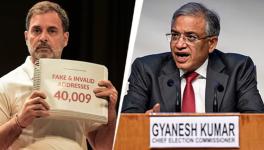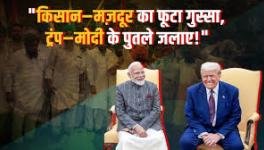For Whose Interest Is India's Economic Advisor Working?
Newsclick interviewed D. Raghunandan, from All India People's Science Network and former member of the Low Carbon Path Committee of India's Planning Commission on the letter by the Chief Economic Advisor to India, Arvind Subramanian to the Prime Minister of India. Raghu said, Arvind is completely moving away from the long time stand by India and advising to be part of US interests. He argues there should be distinction while considering the developed countries as opposed to the developing countries as far as emission controls are concerned. Raghunandan suggests the letter is completely masking the role of the US in the past. He emphasised that the principle - "Those who are responsible for pollution is also responsible for clean it up" - should be the way forward. He also pointed out the false promises made by the US several times before.
Rough Transcript:
Prabir Purkayastha - Hello and welcome to Newsclick. Today we have with us D. Raghunandan, from All India People's Science Network and former member of the Planning Commission's Low Carbon Committee. Raghu, The Chief Economic advisor to India, Arvind Subramanian is given a letter to the Prime Minister, arguing that India should change it's stand in the climate negotiations completely. What are the main points of this letter and how does it effect India's previous positions?
D. Raghunandan - The main points that he has given in his letter are, one that he thinks India should abandon it's position on equity. That is the key position he has done. As you know India has long advocated the position that they should be a strict differentiation between the developed countries and developing countries as far as their obligations on emission controls are concerned, which is part of the UN frame work convention and the US has been particularly keen to dismantle what they call this firewall between the developed and the developing countries. And Arvind Subramanian is advocating that India should give up this equity position. The argument he is advancing is particularly interesting because he is not arguing that the position is incorrect. He is arguing that this is not an argument that will sellparticularly to the US and the advanced countries and therefore India should give up the position in order to appear a good boy in the international negotiations, that is one key position. His other positions are surprisingly, often mutually contradictory and to my mind, also fly in the face of known global tends in politics as well as in the climate debate. He is argued for example that the adaptation issue has been over played, particularly by India. He has argued that India should drop out of the race as far as finances are concerned that India should not claim any financial costs for any mitigation that it accepts, which may or may not be accepted by those of us in India who are arguing that India could under take some mitigation actions on its own but serious efforts at mitigation will require both technology and financial assistance, So that is the second position. Thirdly, he seems to be arguing somehow that India's long term Geo-political status will call for a shift in India's position, essentially that India should abandon it's traditional allies in the least developing countries, the Africa group and India should give up it's alliance with the BRICS countries, which means that then India put all it's eggs into the basket of the developed countries. That doesn't seem to be any logic to this, either in terms of India's emissions profile or in terms of India's socio-economic profile or demography. The only logic seems to be to curry favor with the US and the European countries.
PP - Issue about equity. Now there has been a lot of discussion around here. India has always held in the climate change negotiations, is this equity issue is not only related to per capita current emissions, also historical emissions. So both current emissions as well as historical emissions, Subramanian's position seems to be that we give up both. Is that correct?
DR - Yes, by and large. Although he is not very explicit about that but by and large he has suggested that historical emissions is not something to be even spoken about. So I think Subramanian's position as I was saying at the beginning, it is rather confused position. It is mutually contradictory in parts and also contradicts some of the leading trends. But in terms of this, the historical emissions, he is not inseem to be really accounting for that. He is only talking only about future emissions so that is an another area in which he is just going along with the narrative of the US and other developed countries. Because in the UN frame work convention on climate change, the crucial issue on equity is not merely emissions going forward, it is that historically the temperature rise and climate change are caused by the already accumulated green house gases in the atmosphere. 77% of which has been put there by the developed countries due to their emissions since the Don of the industrial era. Thats the basic cause so even if emissions going forward are controlled, 75% or 77% is already put by the developed countries, and therefore following the well known international environmental law principle of pollute appears " Those who are responsible for the pollution are also responsible for the clean up." And that is why the onus has been placed on the developed countries to cut their emissions firstly and to make payments to meet the costs of adaptation in order to cover the damages caused by the climate change. Arvind Subramanian's letter ignores this aspect entirely and talks only about future emissions, and even there, he doesn't think that the equity argument is really applicable that we should just go ahead and do what is necessary in order to be part of the big boys club.
PP - A big boy in this case being the United States essentially. He is also talked about the UN Security Council seat, which already the US is on record in the United Nation is opposing. So essentially this is currying favor with hopes in future of securing something, which we don't know what is going to be all about but giving up the positions that you already have and also all your allies, is that correct?
DR - Thats right. Thats his position. And what surprises me is, he is advocating giving up the alliances which India has had with the Africa group and with the least developed countries, unfortunately in fact India has for long already diluted those relationships in the climate negotiations and we have been at the receiving end of quite sharp criticism form the LDCs, from the small Island states, from Copenhagen onwards because we seem to have gone along with this idea of forming common cause with the developed country block rather than going with this but when it comes to discussing India's emissions, we are hide behind the least developed countries--the Africa group-- to say we are also developing country, target should not be applied. Where as the least developed countries, the Africa group and the Island nations are saying is, that India also does need to take on greater responsibility and truly act as a champion not only of the interest of the least developed countries but also to ensure that the global targets meet the two degree sea goal and India has failed miserably at that, not only in its own terms but failing to put any pressure on the Americans, in particular to take on more serious emission mitigation targets than it has and India has failed in doing that. Arvind Subramanian's letter also completely silent, of course he is going to be silent because he doesn't want India to put any pressure, his letter is all about how India can make common cause with the Americans in the climate thing, in order as you suggest, to cement some kind of relationship with the United States.
PP - It is also interesting, as a fellow of the Peterson institute he had written to the US Committee looking at 301 that India should be proceeded against WTO trade dispute body, taking India to the task for it's Intellectual Property Rights protection, now it is interesting that, basically thats what provides cheap medicine not only to Indian people but also to large part of the world. Interestingly enough if apply the intellectual property rights issue, one of the issue that we have always raised or people have raised is the fact that, people should not have to pay the price for the intellectual property when it comes to climate change mitigation efforts. But here, if you go by what Subramanian is saying, the intellectual property rights regime he really want to be strengthened rather than talk about how to weaken to help other sections.
DR - In fact as I was saying, I think the big picture of what we can learn from Arvind Subramanian's letter to the government is that, he has virtually wholesale accepted the narrative being put forwarded by the US regarding the climate change negotiations, which is no 1. Abandon any concepts of equity. It is considered a fair, narrative to say you also reduce emissions, we also reduce emissions. You can do slightly more, we can do slightly less, thats about it. So thats the first. Secondly, the US is pushing the negotiations towards Paris more and more to purely focus on mitigation, not to discuss adaptation, not to discuss loss and damage, and technology is virtually being put on the back burner. That is not a subject coming up at all because it is to do with IPR, its more complex issue, it is really not part of these negotiations on climate, it has to be dealt with somewhere else. This is almost wholesale acceptance of the US narrative in the climate change negotiation and thats what Arvind Subramanian has been pushing.
PP - US also has made some promises to reduce these emissions by 30% going up to 2030. How serious are they and how do they square up to what he was really to do as per even the Kyoto, earlier protocol that was there?
DR - In terms of negotiations for Paris, this announcement by US is nothing new at all, contrary to the noises coming out of the white house and out of liberal media in the US that this is some kind of a breakthrough announcement by President Obama, that this is going to not only change US climate policy dramatically but it is also going to put pressure on other countries to up their commitments. This commitment is no different from the earlier commitment. In fact, it is part of the US's trajectory, of how it will make up the 26-28% that the US had already committed. If you remember their earlier commitments at Copenhagen under the Waxman-Markey amendment, promised a 17% cut by 2020. So this is just pro-rata increase of that up to 2030, 26% which subtracting the 14% they already incurred in increase between 1990 and new baseline of 2005, which the American has set for themselves is talking only about 13% cut by 2030, which is a miserable announcement by any standards. You compare it with European offer, which is 40% cut by 2030. So the American's cut, the announcement is not serious, it does not go beyond any cut they have said earlier, it only in fact spells out how America will achieve the cut they had earlier announced, it is nothing additional. The only thing I will say for it is, the flip side of that is, from the international perspective, I think it is a completely not-started, makes impact whatsoever, but it looks within the domestic American context, as having set a different momentum to discussions on climate change within the US and of course given the election season which is already on, it will change some of the dynamic of the discussion on climate change within the US.
PP - Thank you very much Raghu, will continue to watch what happens in the climate change negotiations, particularly with rum up to Paris. Thank you very much.
DISCLAIMER: Please note that transcripts for Newsclick are typed from a recording of the program. Newsclick cannot guarantee their complete accuracy.
Get the latest reports & analysis with people's perspective on Protests, movements & deep analytical videos, discussions of the current affairs in your Telegram app. Subscribe to NewsClick's Telegram channel & get Real-Time updates on stories, as they get published on our website.
























